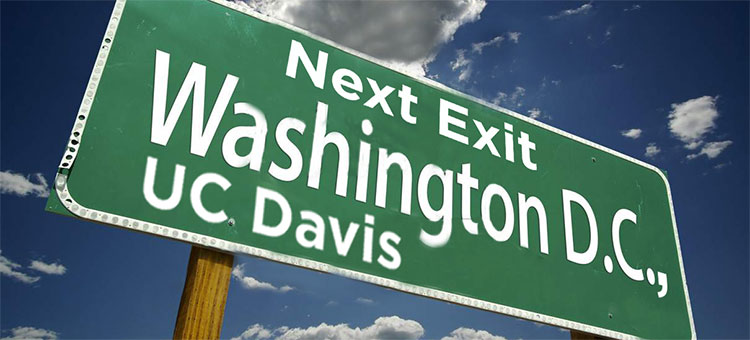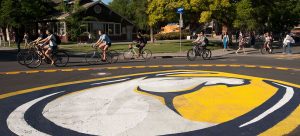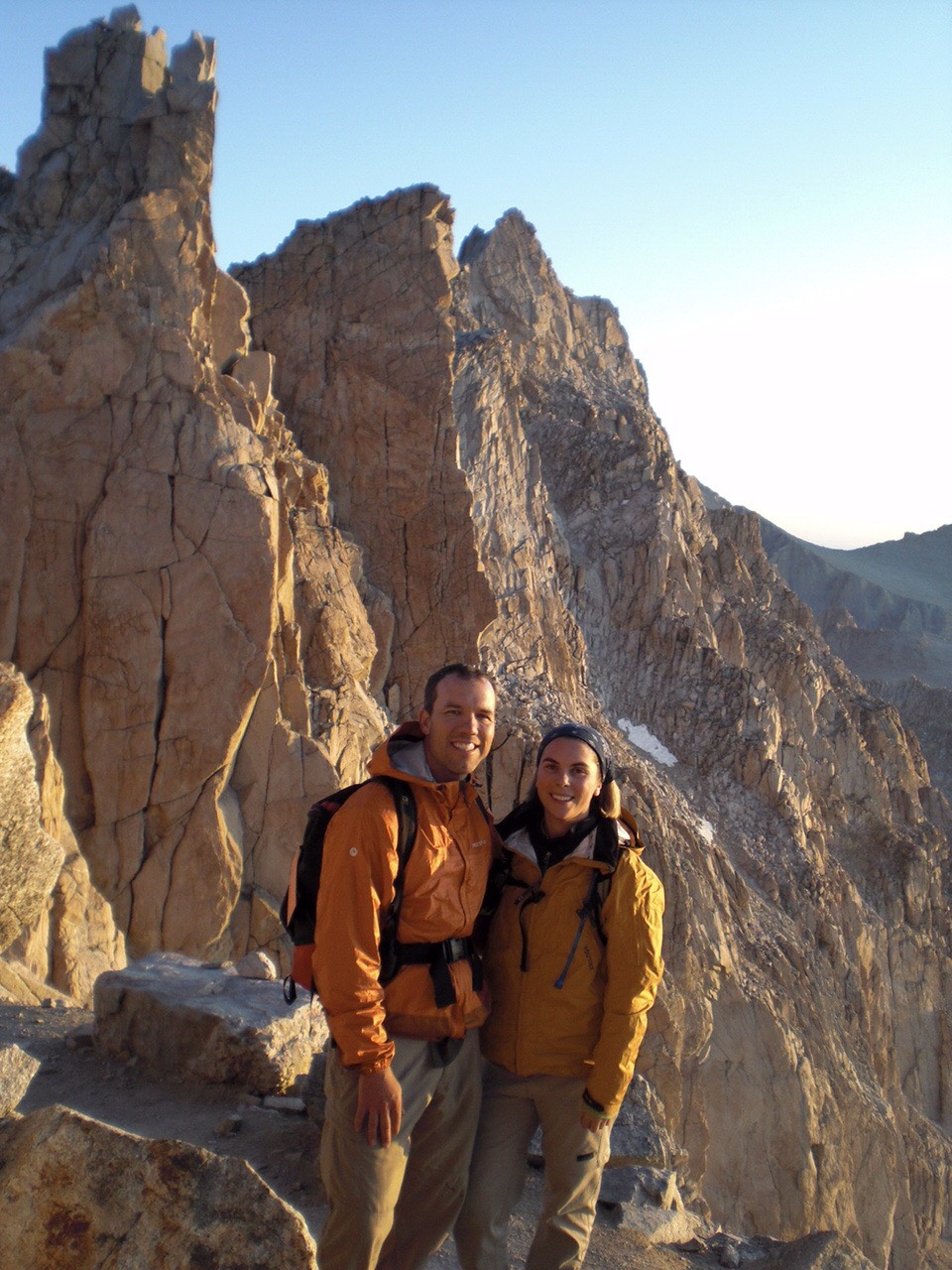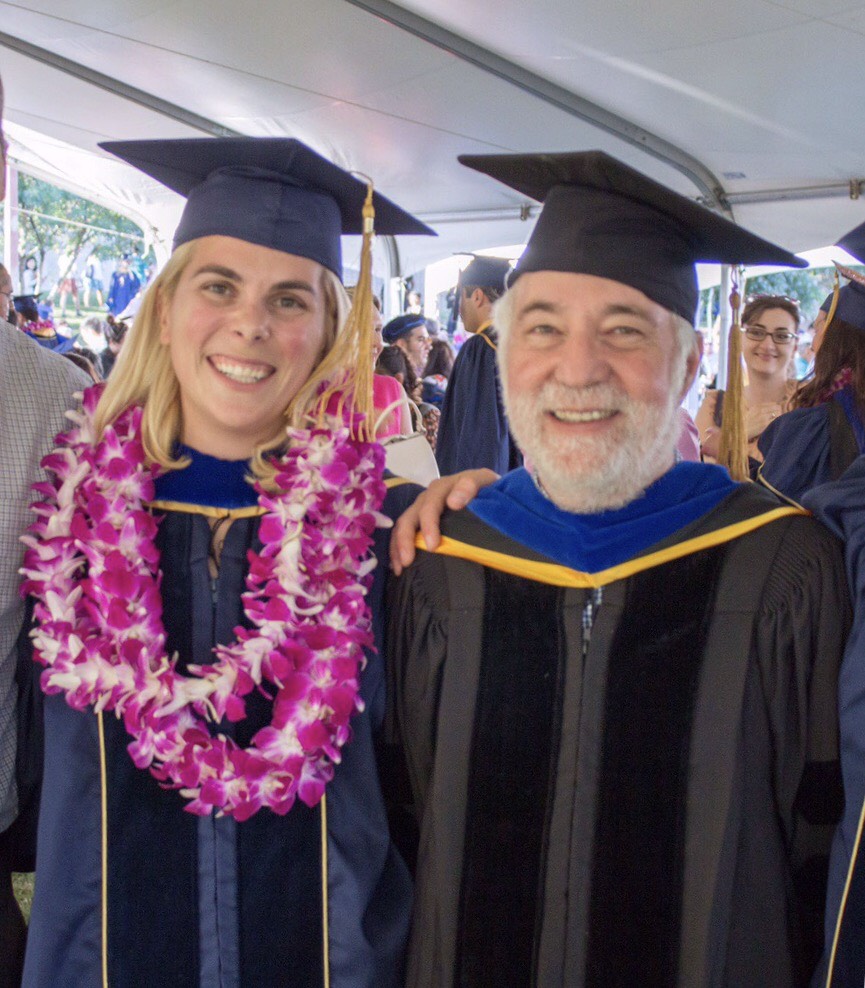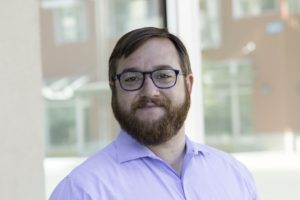Archives
3Revolutions 2018 Conference
Go East, ITS-Davis Researchers! 50 Faculty and Students are D.C.-bound to Participate in TRB’s 2018 Annual Meeting
When the 97th meeting of the Transportation Research Board convenes in Washington, D.C. from January 7-11, 2018, ITS-Davis will be highly visible—in the program sessions and at the annual gala reception hosted by the Institute.
Approximately 50 ITS Davis representatives—academic and research faculty and including students from the Transportation and Technology Policy graduate program—will participate in the conference as presiders and presenters. Faculty will preside over TRB committee and subcommittee meetings, and faculty and students will present their research findings at the meeting’s workshops, lectern sessions, and poster sessions. For a complete list of ITS-Davis presenters/presiders and the sessions in which they’re participating, click here.
A long-standing tradition at TRB is the reception hosted by ITS-Davis. This year it is on a new night—Monday. No RSVP is required to join UC Davis Institute of Transportation Studies faculty, students, alumni, and friends at this popular event. Featuring light refreshments, the celebration of a new year of innovation in sustainable transportation will be held on Monday, January 8 at 8 p.m. at Ballroom A of the Walter E. Washington Convention Center, 801 Mt. Vernon Place, NW.
Another event occurring during the conference week is a Capitol Hill Research Briefing on Monday, Jan. 8 at 12 p.m. with the theme, “Driverless, Shared, Electric: The Three Transportation Revolutions. The briefing at the Rayburn House Office Building is sponsored by the National Center for Sustainable Transportation, and co-sponsored by the UC Davis Policy Institute and ITS-Davis. An RSVP is required to attend the briefing. Email: 3rev@ucdavis.edu
During TRB Week: Why UC Davis? Talk to our Professors, Grad Students & Alumni
With so many faculty, students and alumni assembled in D.C. for TRB, it’s an excellent opportunity to find out firsthand about the renowned Transportation Technology and Policy (TTP) Graduate Group program, hosted by ITS-Davis, as well as transportation research position opportunities that are available at UC Davis.
TTP offers M.S. and Ph.D. degree programs that prepare students to play decisive roles in creating a sustainable transportation future. Professor Susan Handy, TTP’s faculty director, will be in D.C. for the TRB meeting, as will Dr. Gil Tal, TTP’s graduate advisor for recruitment and admissions. Other faculty and students and alumni at the TRB meeting can provide their unique insights and experiences about transportation study and research at UC Davis. (You may also contact ITS-Davis Graduate Program Coordinator Annemarie Schaaf, at aschaaf@ucdavis.edu)
Additionally, graduate student and postdoctoral research positions are available at UC Davis at the Institute of Transportation Studies (ITS-Davis) in the field of sustainable transportation vehicles and fuels, shared and electrified mobility. These new positions are made possible because of two major awards: designation as a National Center for Sustainable Transportation (by the U.S. Department of Transportation) and substantial funding from the State of California. Positions also may involve working with the Sustainable Transportation Energy Pathways Program (STEPS), involving modeling and analysis of vehicle and fuel pathways to 2030 and beyond in a California, U.S. and global context. For general inquiries about grad and postdoctoral research positions, contact Gil Tal at gtal@ucdavis.edu
If interested especially in shared and automated mobility research (3rev.ucdavis.edu), send a note of interest (with qualifications and statement of interest) to Professor Dan Sperling at dsperling@ucdavis.edu
If interested in research related to electric vehicle adoption (phev.ucdavis.edu), send a note of interest (with qualifications and statement of interest) to Plug-In Hybrid & Electric Vehicle Research Manager, Dahlia Garas at dmgaras@ucdavis.edu
5,000 Miles of Bolt Ownership
by Austin Brown

This is a follow up to my previous post, 500 miles of Bolt ownership. After more time and many more trips, I have learned a few more things that I wanted to share.
Happiness is actually getting a parking spot at the airport with a charger – this was the first time I won the charger “lottery” at Sacramento Airport!
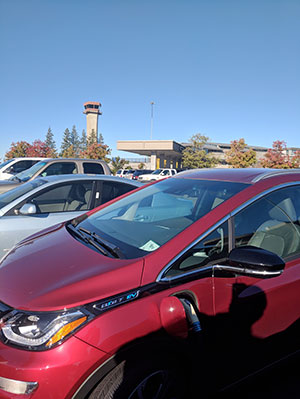
A few months and 10 times as many miles later, I still love my Chevy Bolt. My average efficiency has dropped a bit from my first post, perhaps because the tires were a little lower pressure for a while, or maybe I just stopped being so obsessive about it. It’s still averaging about 3.9 miles / kWh with the vast majority of miles on highway. I can safely and comfortably walk and bike around Davis so I rarely drive in town, but have surprised myself by driving more than 40 miles a day on average. I definitely got to 5,000 miles more quickly than I anticipated! My most common weekday use is getting to Sacramento for work purposes, and I routinely drive to the Bay Area (though I still prefer the train if the timing works out since I can work or read). I also have had a great time using the car for weekend trips (details below).
I’m still very impressed with the performance, range, and general fun of the Bolt. I’ve found that people are very curious about the car, and now that I have an HOV sticker more people notice that my car in an electric vehicles (EV) and ask me about it. The number-one question I get is, “How do you know it won’t run out of charge?” My go-to answer: “How do you know your car won’t run out of gas?” The Bolt, like any car, tells you right on the dashboard how far you can go before you run into trouble.
While I count myself a happy Bolt owner, I’ve also learned that being an early EV adopter comes with a lot of challenges, mostly in terms of the availability and functionality of charging infrastructure. Driving an EV—especially as your only vehicle—definitely requires you to be more strategic and thoughtful than driving a conventional car. As someone who studies EVs as part of my job, this shouldn’t have been news to me, but my newfound firsthand experience has driven home the positives and negatives of being an EV owner. To mark my 5,000-mile milestone, I thought I’d share some of those lessons.
Charging forward
EV charging options vary more than fuel options for conventional vehicles. At a gas station, you often only have two choices: regular or premium, and though the latter might be more expensive, both usually work. (Side note: always go for regular unless your car manufacturer specifically tells you otherwise. But that’s a topic for another day.) With EVs, though, the three commonly available charging options—level 1, level 2, and DC fast charge—vary considerably in terms of charging speed and cost. The California Clean Vehicle Rebate project provides more information on EV fueling options, and I’ve summarized the differences in the table below. The upshot? I use level 1 rarely, level 2 routinely, and DC fast charge for long trips.

As a scientist and general dork, I can’t resist going deeper into the technical details, but if that’s not your cup of tea, go ahead and skip on down to the next section.
The Bolt, like most EVs, comes with a charger that can connect to any standard wall outlet (120 volts) at 8 or 12 Amps. That’s basically what Level 1 charging is: plugging your car in like you’d plug in any other household appliance. Level 2 charging uses the voltage (240 volts) and current (generally 30-50 amps) associated with higher-power appliances in the home, such as your clothes dryer. The most important thing to keep in mind here is that level 2 charging isn’t twice as fast as level 1…it’s around four times as fast. That’s because power (the measure of the rate at which energy is transferred) is proportional to the square of the voltage for a given resistance. So when you double the voltage, you quadruple the power. Another way to think about this is that power equals voltage times current. Since level 2 circuits have higher voltage and higher current, they result in much higher power. Level 2 can fully recharge the Bolt’s 60 kWh battery during a work day or overnight. Level 1 is better suited to a hybrid car like the Chevy Volt, which has a <20 kWh battery and backup gasoline engine, or for people who plug in every day and don’t drive a long way any given day.
DC fast charging is a term that includes chargers with a wide range of power ratings but is faster (of course) than level 2. DC stands for direct current – the supply comes directly as direct current to charge the battery (rather than converted from AC by an on-board charger as in levels 1 and 2). Fast charging requires a vehicle that can handle it (and I’m very glad I got that option on the Bolt, it’s not standard) and a station that can supply it. Most of the DC fast chargers I’ve used have been able to provide the middle 50% of charge in less than an hour. (Fast charging gets slower as the battery is closer to full, so it’s hard to get a great sense of average rate.) I’ve only fast charged three times so far, twice on a trip to Lake Tahoe trip and once near Monterey (see below). The fast chargers I used provided about 30 kW, which took me from 25% charge to about 80% in an hour. Chargers that are several times faster than this—providing 250 or even 350 kW of power—are currently being tested. If successful, these chargers would provide most of a full charge in the time it takes to drink a cup of coffee.
For now, EV owners face a number of charging challenges, or at least annoyances. Chargers are readily available along many California highways, but venture further and fast charging becomes hard to come by. (Unless you own a Tesla and so have access to Tesla’s exclusive network of chargers.) Even if chargers exist, they may not be available or functional. There is often a wait to use chargers in EV-dense areas, and I’ve already run into a broken charger (it had a boot screen on the display) that caused a fair amount of annoyance.
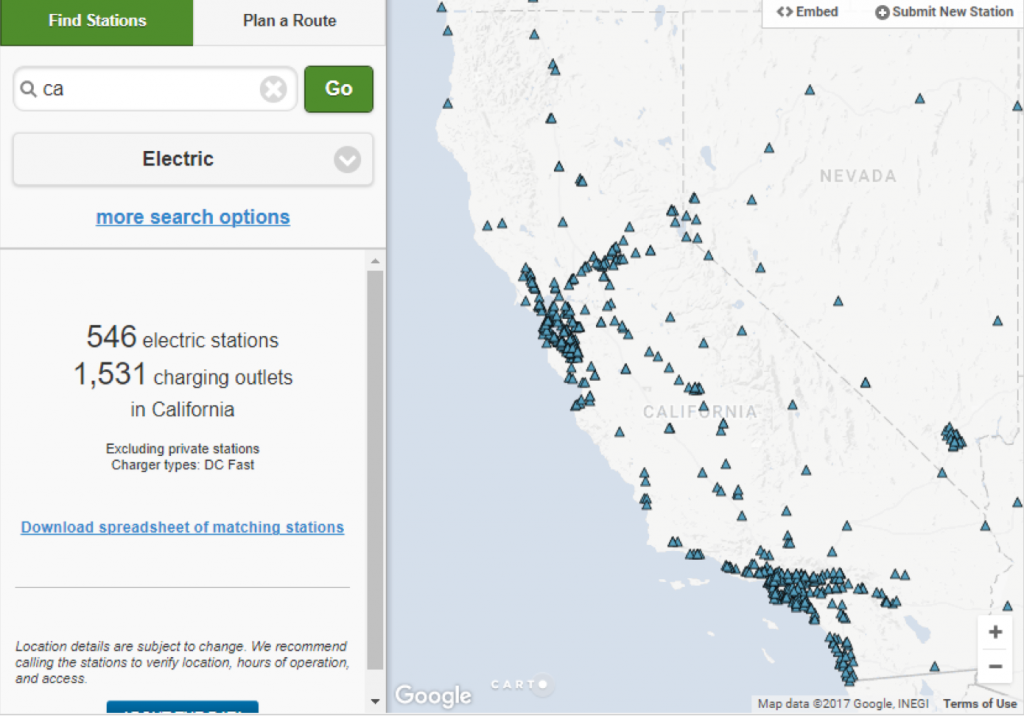
In my opinion, the greatest need is for more reliable information on chargers. There are several apps and other online tools that help EV owners find chargers, but no one resource provides comprehensive information on charger type, cost, availability, functionality, and access limitations. To get more people to drive electric, we need to make sure that EV owners can be confident that they’ll be able to find a usable charger when they need it.
Having more chargers would certainly help address the charging problem. But in the meantime, what would really help is the ability to be able to reserve a charger for the time I plan to arrive. Once chargers become as ubiquitous as gas stations, EV owners won’t have to worry about fueling any more than owners of conventional vehicles do now. But until then, being able to know for sure that you’ve got a charger waiting for you along the way would make EVs much more attractive.
Oh, the places you’ll go!
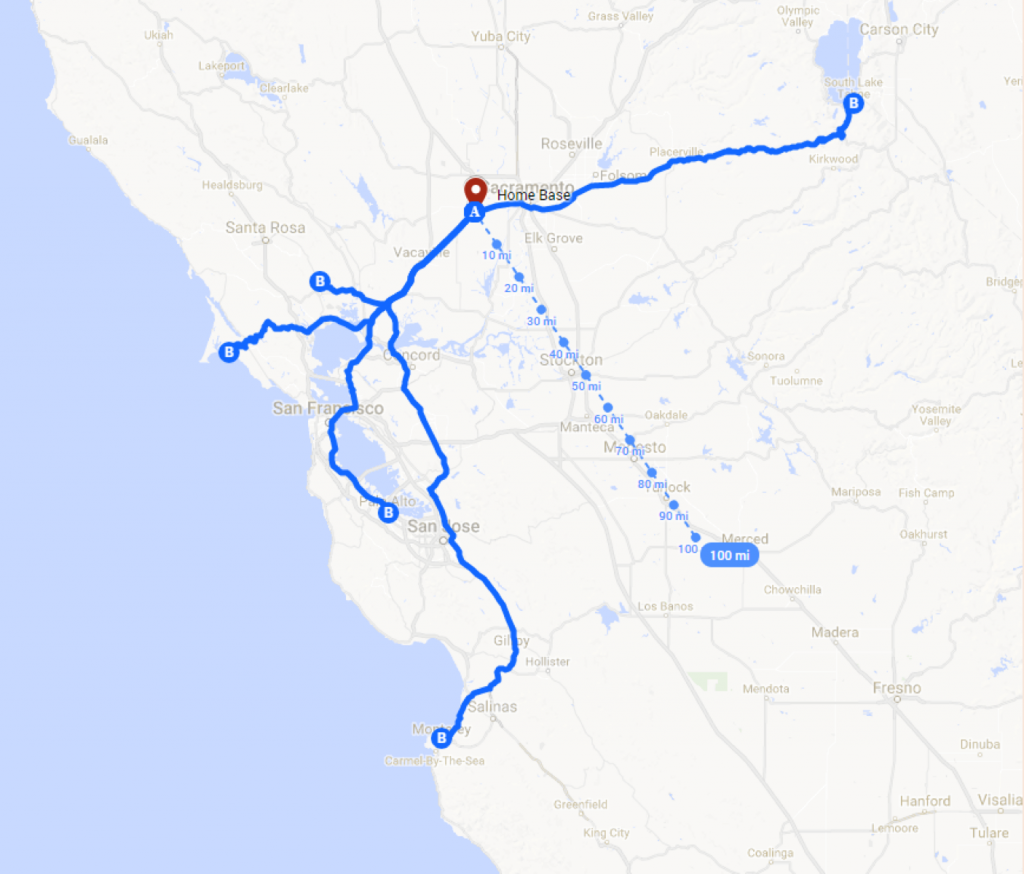
A map of some of my more fun trips, with a 100 mile marker for scale. I haven’t really pushed the limits yet. West to east, destinations are: Point Reyes, Sonoma, Palo Alto, Monterey, and South Lake Tahoe.
The great advantage of car ownership is getting to go where you want whenever you want. I’ve taken full advantage of that since I bought my Bolt. Any trip that’s 200 miles or less round-trip is well within the Bolt’s range and isn’t a problem at all. For someone living in Davis like me, this means I can easily access a bunch of popular destinations—including Sonoma, Point Reyes National Seashore, San Francisco, and Palo Alto—as long as I charge up the day before. I’ll charge my destination if it’s easy, but it’s not necessary in order for me to make it back home. Longer trips, though, require a bit of planning.
Probably the most ambitious trip I’ve taken in the Bolt was to South Lake Tahoe, about 115 miles from Davis. Climbing the steep mountains is a big part of why getting to Tahoe is tougher than a normal 230 mile round trip. Basic physics tells us that moving something uphill takes more work than moving that same object over flat ground. Driving the Bolt up into the mountains and seeing the expected range displayed on the dashboard drop much faster than usual really drives this point home. For fun, we can calculate just how much elevation affects range in theory. A Bolt carrying 4 people and luggage will likely be at least 4,000 pounds. Lifting that mass from sea level to Echo Summit (the pass you go through on the way to South Lake) at 7,377 feet requires at least 11 kWh of energy. That’s a full 18% of the total capacity of the Bolt’s battery! The good news is that you basically get to recover your entire energy investment on the return. When I made the trip, the Bolt’s battery charge basically stayed constant throughout the 50 miles from Echo Summit down to Placerville. The charge regenerated on the steeper downhills and only used a bit of energy on the flatter sections. With the cruising you get to do on the way down from the mountains, the Davis to and from South Lake Tahoe trip might be possible to do without charging, but it would take a lot of caution as well as some practice to make sure you drive as efficiently as possible. You also wouldn’t have any charge to spare to drive around at the lake. On my trip we charged twice at fast chargers. Personally, I wouldn’t make the trip without the assurance of either level 2 charging at my South Lake destination or good fast charging options on the way.
I still haven’t tried out a full road trip (i.e., driving to a destination that I can’t reach on a single charge), but I may give it a shot for a few possible outdoorsy things I have coming up. To make such a trip, I’ll need to rely on fast charging during the day and find places to stay with good level 2 charging overnight.
Low maintenance
One random factor I didn’t know before owning the Bolt is that tire rotation is especially important for EVs. In a conventional car, the brakes apply equally to all four tires. In an EV, though, braking is used as a way to recover energy. This is accomplished by the front wheels (the drive wheels) only. As a result, an EV will wear the front tires especially quickly from braking.
Tire rotation is the exception to the rule. In general, EVs require almost no routine maintenance and have a much lower chance of component failure relative to conventional vehicles. For instance, here is the maintenance schedule for the Chevy Cruze (a gas-powered vehicle comparable in size and specs to the Bolt):
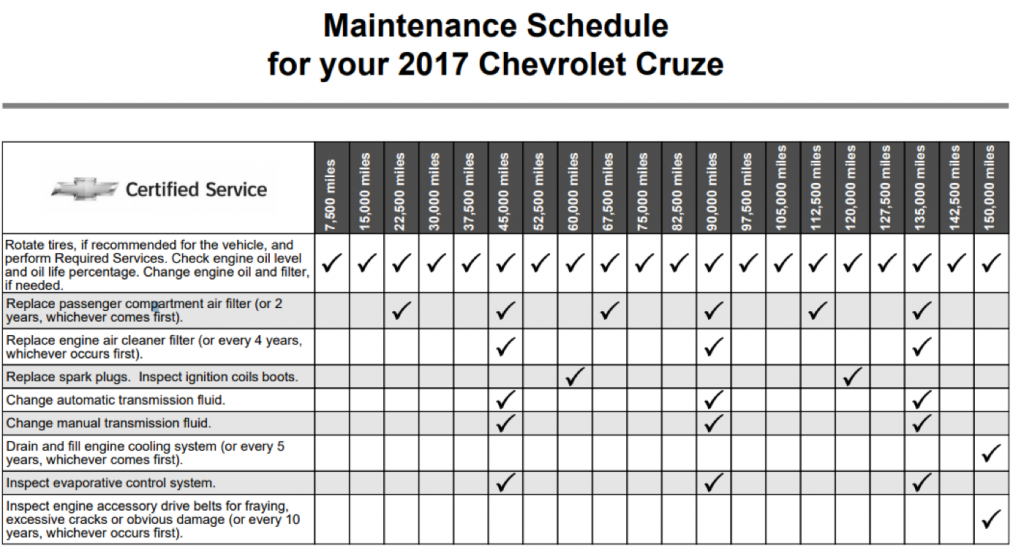
You can see that the Cruze – like any conventional vehicle – requires a lot of routine maintenance, including replacing oil, engine air filters, spark plugs, and various fluids, as well as inspecting of the thousands of moving parts that make up a conventional vehicle drivetrain.
By contrast, this is what my maintenance schedule looks like:

2017 Chevy Bolt Maintenance Schedule (PDF)
Rotate the tires and replace the passenger compartment air filter every couple of years. That’s basically it for 150,000 miles. Of course, the thing that everyone wonders about is how long the battery will last. There is no way to be sure—this is new technology, after all. The Bolt’s warranty covers 8 years or 100,000 miles, but allows for some significant degradation. The good news, though, is that batteries in electric vehicles in general have tended to hold up very well. Remember all the concerns that Prius batteries (a different chemistry, but the longest-running example we have) would need to be replaced every other year? That never happened, and in fact Consumer Reports found that “Prius’ maintenance and repair costs placed it among the least expensive 10-year-old vehicles to own. Tesla batteries have also held up very well. And by all accounts, the Bolt battery pack is very well engineered, containing an active thermal management system that keeps the battery in a good temperature range (extreme heat and cold are very bad for batteries) even when the vehicle is off. But I promise that I’ll check back in on battery resilience in my “50,000 miles of Bolt ownership” post in four years or so.
The future
Since I bought it, the Bolt has caught on. Some awards, positive press coverage, and word-of-mouth have all contributed to the Bolt becoming one of the country’s most popular EVs. Chevy and a series of other automakers have announced rapid expansion of their fleet of EVs; finally the carmakers are competing to win in the electric marketplace.
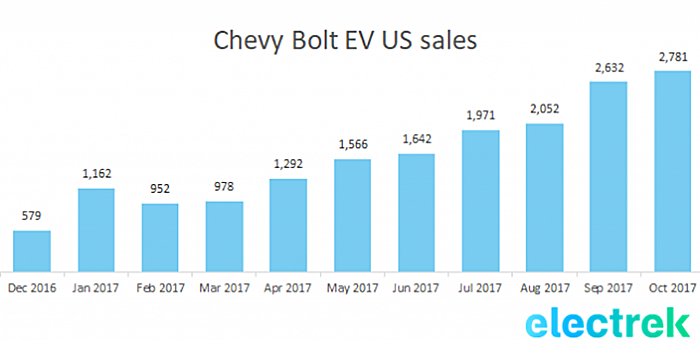
https://electrek.co/2017/11/01/chevy-bolt-ev-sales-record-us/
Although EVs are still a small share of the market even in an EV-friendly state like California, the future of the electric vehicle looks very bright. We still need technology improvements to increase range, charging speed, and performance, but the vehicles we can build today are already fantastic. We also need a greater diversity of EV models: bigger vehicles for families, four-wheel-drive EVs for snow lovers and campers, etc. Finally, we need more charging infrastructure and much more reliable information about the chargers that already exist, but these are in the works and should be achievable. It’s been really fun to be a part of the EV movement so far, and I can’t wait to see where it goes.
And of course, one of the very best parts of being an EV owner is that you never have to buy gas. My new favorite terrible dad joke is when anyone mentions going to a gas station and I get to ask, “what’s a gas station?” Eventually, that will be what all the kids say.
Austin Brown is the executive director of the UC Davis Policy Institute for Energy, Environment, and the Economy.
Read the article on LinkedIn: https://www.linkedin.com/pulse/5000-miles-bolt-ownership-austin-brown/
500 Miles of Bolt Ownership
When I moved to Washington, DC in 2008 to work at the Department of Energy, I went carless. I had gotten frustrated with what felt like constant hassle and bills, and had no desire to deal with owning and parking one in the city. DC made it pretty easy to thrive with transit, walking, biking, (eventually) ride-hailing apps, and a few well-wheeled friends for longer trips. At that time, there were essentially no options for plug-in electric vehicles on the market. The Tesla Roadster was just beginning its run, and while I admired the car it was well out of my price range. I hoped out loud to my new colleagues that by the time I was in a life situation requiring vehicle ownership, electric would be a viable option. I got my wish and then some.
Last Thursday I picked up my first-ever new car – a shiny red Chevy Bolt. I don’t want this post to end up as a free advertisement for Chevy, but I do want to gush a little bit. The main reason I went with the Bolt is that it offers a game-changing 238 miles of range. This makes a host of trips that were previously only possible with a Tesla totally doable, even without the gas engine range extender of its (frustratingly) similar-named sister car the Volt. Mine has already taken me on a 210 mile trip to go hiking, including freeway driving and lots of hills, and returned with more than 40 miles of range remaining – and a few pounds of dust to show I’ve broken it in a bit.
So far, 500 miles, 2 long hikes, many shorter milk runs, and of course 0.0 gallons of gasoline used. For the transportation nerds, it’s gotten an average of 4.2 miles / kWh (and that’s with the A/C running and mostly 65-70 mph highway miles). For non-transportation-nerds, trust me, this is high; in miles per gallon of gasoline-equivalent, that’s around 140 MPGge, and (with my electricity mix) about one quarter of a normal gasoline car’s GHG emissions. The emissions will also drop as California and the grid overall move to cleaner electricity.
The driving also feels great, with the addictive responsiveness of electric on full display. If you’re never driven a modern electric vehicle, I highly recommend giving it a try – gas-powered vehicles will forever feel sluggish in their response to the pedal. Another amazing feature of electric is regenerative braking, where the motor essentially operates in reverse during deceleration to return energy to the battery. It’s obvious this saves energy, but what is less obvious is how beneficial this is to the brakes. The Bolt can operate in a mode where taking your foot all the way off the accelerator goes into high regeneration, meaning the brake is only needed for unexpected or emergency stops. In 500 miles+ I think I have had to use the actual brakes perhaps a dozen times.
I am impressed by other things about the Bolt, but as I said, this post is more about EVs generally. What the vehicle means to me broadly is that we’re rapidly approaching a point where going electric isn’t a sacrifice and doesn’t even need to be a statement. There are now dozens of models available in a variety of ranges, drivetrains, and form factors – with plenty more on the way. The past month has seen a spate of announcements from automakers and even countries showing that, in their view, the future of the car is electric.
We’re not done. EVs are still a small market share, and face real challenges. Even in California, many people aren’t even aware that EVs are for sale. Despite generally strong reviews and owner accounts so far, the Bolt hasn’t been flying off the lot yet – its first five months of sales were comparable to other new EV offerings, though it has picked up some steam in the last couple of months. Societally, EVs also face an equity challenge – they are seen as cars for the wealthy. Part of my job is working with my colleagues and collaborators to figure out how to make sure that great options are available to everyone.
So, reasons for optimism, but still plenty to do in the race to a fantastic and sustainable transportation system. My next hope is that my next car will once again be not having to own one – but this time because electric, shared, automated vehicles will be a full reality.
Probably goes without saying, but this post is my personal views only and does not reflect on any employer past or present.
Austin Brown is executive director of the UC Davis Policy Institute for Energy, Environment, and the Economy.
Credits and Rebates Play a Key Role in Building Consumer Market for Cleaner Electric Vehicles
Mobility Quest 2017: A Grad Student Field Trip Where “A Group of Strangers Became a Community”
For several years, incoming ITS-Davis students have started their academic year with a fun-filled and educational travel adventure that serves as a bonding experience and an opportunity to learn about transportation in the real world. This year’s Mobility Quest (MobQuest) was a five-day, multi-modal trip to the Bay Area and beyond, featuring several transportation innovations unique to northern California.
To kick things off, students headed to Santa Cruz with surf, sun, sand, and mobility on their minds. MobQuesters meandered along Beach Street, observing historic railroad tracks, protected bike lanes and welcoming pedestrian facilities. Later, they hovered above the beach boardwalk aboard a transportation mode that is only offered in a few places in the world—the Sky Glider gondola—then enjoyed a home-cooked dinner and fun evening of games, with a bonfire in the yard.
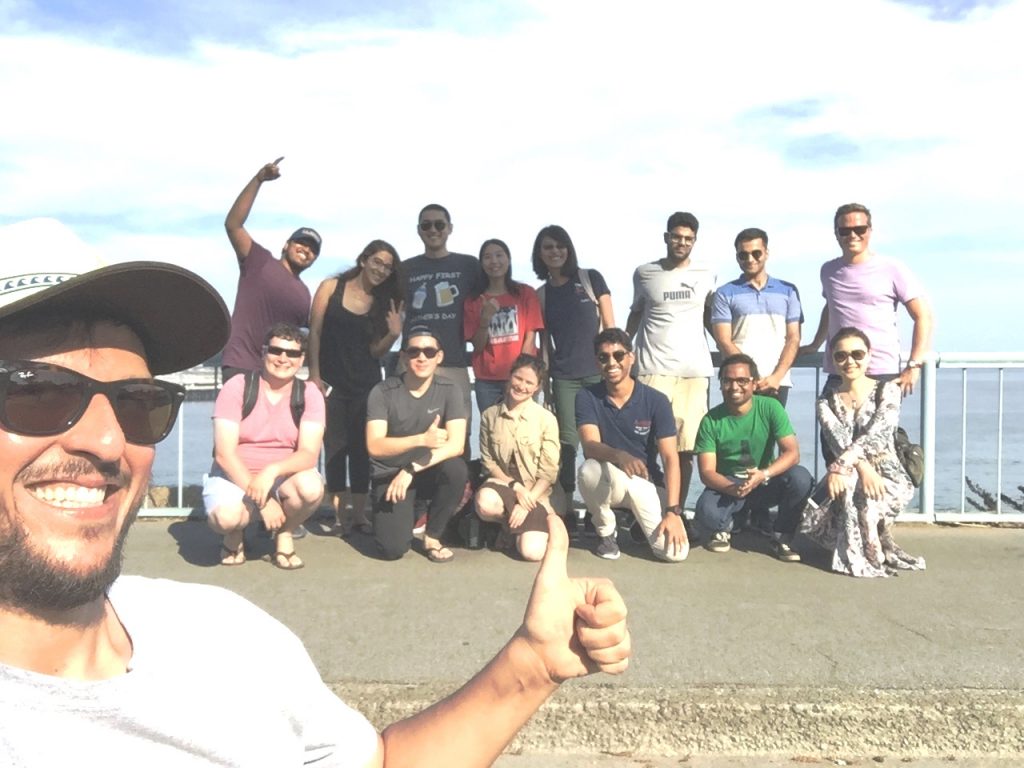
Leaving the beach behind and turning their focus more directly toward their chosen transportation studies, MobQuesters rose early the next morning and traveled to the BMW Group Technology Office in Mountain View, Calif. There they learned about BMW’s sustainability efforts, battery and autonomous vehicle technologies, and outlook on new mobility trends.
In the afternoon, the group visited the newly opened Warm Springs/South Fremont BART Station. Fellow Aggies Paul Medved, the station manager and Zhiming Fan, deputy project manager, led a tour around the terminal, which has achieved LEED Silver certification. Medved and Fan shared the many successes, challenges and lessons-learned throughout the process of station design and construction, and discussed their plans to continue to modify the station as nearby housing needs grow.
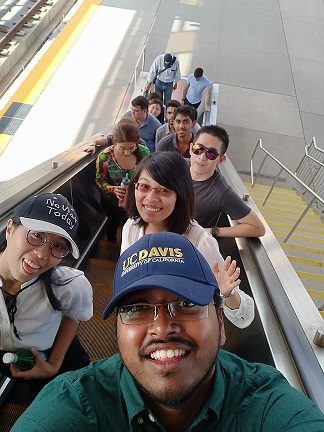
The next stop was BART headquarters in Oakland. Coincidentally, their visit fell on the 45th anniversary of BART’s first day of revenue service. Chief Planning and Development Officer Robert Mitroff discussed BART’s system upgrade and improvement plans that will enable BART trains and stations to handle more users.
The next day, MobQuesters took BART from Oakland to San Francisco. In the morning, they visited San Francisco Municipal Transportation Agency (SFMTA), where they were joined by Professor Susan Handy, director of the National Center for Sustainable Transportation. There they learned about San Francisco’s long-range and project-level planning efforts to improve mobility through active transportation and public transit. SFMTA transportation planners and engineers took the students on a tour of the newly finished 7th and 8th Streets Safety Project, which demonstrates how lane removal, protected bikeways, and boarding islands can make city streets more welcoming and safe.
After lunch with SFMTA staff and Aditi Meshram, an ITS-Davis student who interned at SFMTA last summer, MobQuesters took a Muni bus to their next destination, the International Council on Clean Transportation (ICCT). This visit felt a little like old home week, thanks to ICCT’s employee ties to UC Davis, including ITS-Davis alums Ben Sharpe, Mike Nicholas, Josh Miller, and Nic Lutsey. There, MobQuesters learned about the non-profit organization’s international research programs on transportation technology and policy. Before hopping back on BART, they walked down Market Street to check out the Ferry Building Marketplace, and took a group picture in front of the Bay Bridge.
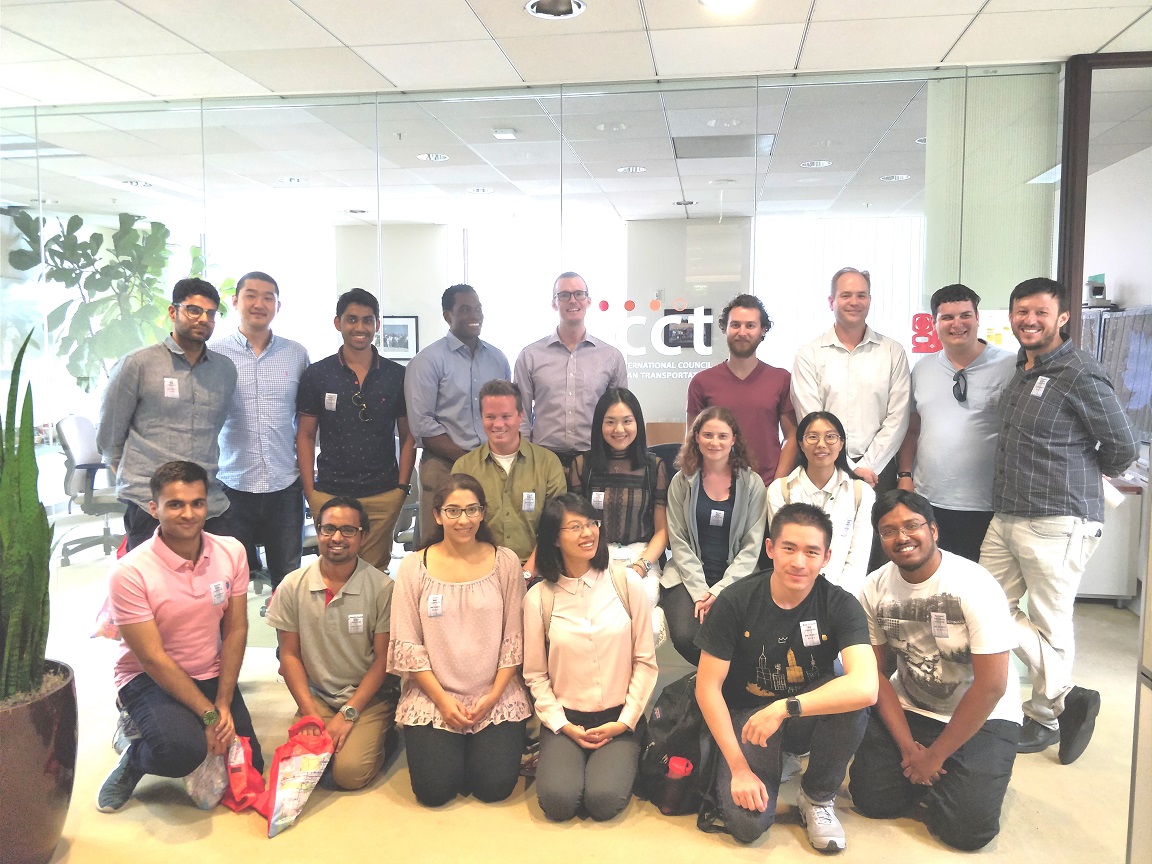
Following the multi-modal adventure day in San Francisco, MobQuesters met up with incoming students from the new UC Davis Energy Graduate Group at the Chevron Technology Center in Richmond, Calif., where they were joined by ITS-Davis faculty members Alissa Kendall, Catherine Brinkley, and David Rapson. Students learned about the refinery process and discussed emissions and energy efficiency with Chevron’s environmental and air quality team. To complete the Refinery 101 lesson, students took a bus tour of the refinery facility and visited the fuel technology and engine testing labs.
The last day took MobQuesters to environmental consulting firm Fehr & Peers in Walnut Creek, Calif. to learn how transportation consultants are using technology innovations and big data to design a better transportation system. At their final stop, students visited Contra Costa Transportation Authority’s GoMentum Station in Concord, Calif., the nation’s largest secure testing facility for autonomous and connected vehicle technology. Students observed varied terrain and infrastructure that closely mimics real-world conditions, and saw some autonomous vehicles, quite literally, “on the horizon.”
Mobility Quest provides incoming students an unforgettable introduction to their new grad school program, offers fresh inspiration to pursue innovative research, and serves as a catalyst for friendships and professional connections that serve students well into the future—for some, a lifetime. It illustrates the unique, interdisciplinary nature of ITS-Davis, bringing together engineers, planners, policy makers, and other skilled learners from broad and varied backgrounds to innovate sustainable solutions for the next century of transportation.
With the 2017-18 academic year now well under way, we look forward to watching how ITS-Davis students, new and returning, will continue to lead ITS-Davis into the future.
Mobility Quest Memories
“MobQuest was the best trip of my life, so far. It showed me how the transportation system, from transit operation, to urban planning to vehicle technology, transforms our daily lives. Seeing these systems in the real world is always different from things we see in a laboratory. It was a good combination of academic and social experience, along with nice friends with diverse research backgrounds and interesting discussions. Most importantly, it was a good start for my American life and study as an international student. ”
–Ran (Frank) Sun
“Mobility Quest was a sweeping introduction to transportation issues and topics of today. It covered everything from technologies on the horizon to planning and today’s demand issues, and it was a great way to meet my fellow incoming classmates. I feel much more prepared to begin my program after having gone on this trip.”
–Peter Benoliel
“MobQuest was a fantastic combination of fun and learning. It was so much fun getting to know my fellow incoming students and the continuing students, too. The diversity of research interests among the students was so striking that you were bound to ask a lot of questions and learn something from each other. The organization and company visits also gave you a new perspective about the way different people work towards sustainability and transportation issues. On this trip, a group of strangers became a community. I definitely recommend it. Lots of thanks to the organizers.”
–Anish Kumar Sinha
“MobQuest is, first of all, a great opportunity to meet and bond with your fellow students in transportation studies. This trip provides a lot of social activities, and it is great to start the school year with friends and familiar faces in the different classes. Second, MobQuest covers different fields that are related to transportation engineering and policies. During the trip we visited fascinating transportation companies and I learned a lot about transportation issues in California and beyond. I highly recommend MobQuest. Be part of this unique experience!”
–Koral Buch
